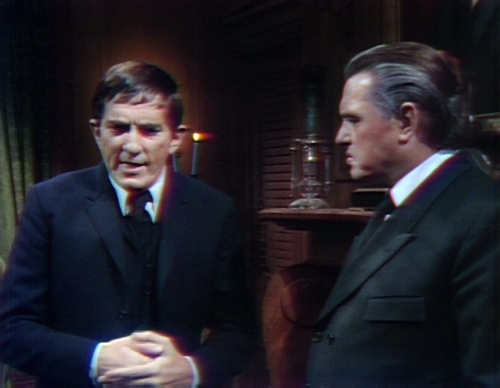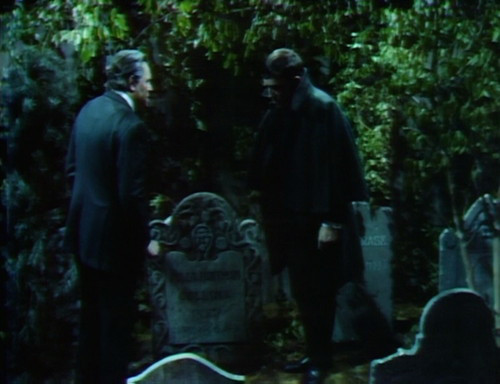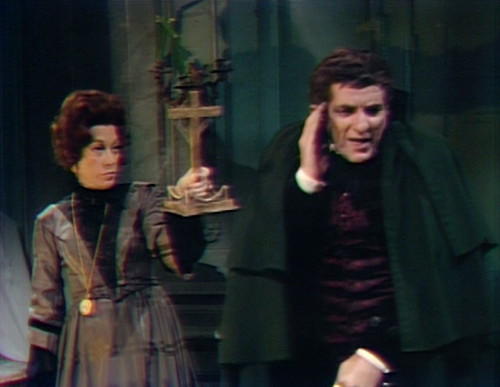“When I saw your grave in 1970, I knew I had to find a way.”
Meanwhile, a hundred and thirty years in the future, another unfathomable time dilemma snakes its way across the room, fizzing and throwing sparks. Time flies, they say, and Barnabas Collins is a frequent flyer.
He sits down, and thinks about the magic Chinese sticks on the table in front of him. Two weeks ago, the whole neighborhood burst into flame, and the outlook post-inferno is decidedly bleak. The few survivors are scattered, broken, unable to heal. His best friend is missing, possibly kidnapped by ghosts or eaten by zombies, or maybe she’s the patsy in one of those lunatic time-travel conspiracies where people load up a sacred altar with books and boxes and instructions and failure and send it all into the future, where it catches fire and explodes into fragments, accomplishing nothing. He isn’t sure. So he throws some sticks on the table, closes his eyes, and gives the situation a good hard think. It’s called crisis management.

“Eliot,” moans the vampire, wringing his hands, “I’m going to find her.” He’s worried about Julia. “That night in the hall, she opened the door, and the stairs were there — that same stairs that brought us back from 1995!”
So this is the problem, obviously. He says that the house fell down because it was full of ghosts and zombies, which is patently false. Ghosts don’t exist, and the zombies were probably just being sarcastic. Collinwood toppled two weeks ago because the inhabitants kept rewriting history, crashing through time barriers and violating building codes like you wouldn’t believe. The house couldn’t keep track of what timeline this was supposed to be, and you can’t keep that up forever. More specifically, you can’t keep it up past September 1970.
And now Barnabas wants to find Julia, no matter where she may be — past, future or sideways. This is the life these catastrophe chasers lead. They believe six impossible things before breakfast — like, a hundred and thirty years before — and this is the only way they know how to solve problems.
“If those stairs brought you from 1995, that must be where Julia is now,” says Professor Stokes, an expert in temporal verticality.
“No,” Barnabas says, without evidence. “I believe the only place those stairs went was back into the past — that’s where all this began!” Which is something you could say about anything.

“I assume you intend to use the I Ching again,” Stokes says, referring to a method of personal time dislocation that naturally we are all familiar with, and does not need to be explained in any way. His assumption is correct.
“I have no other choice,” Barnabas asserts. “Even if I don’t go back for Julia, I have to go back to change history, so that this terrible night couldn’t happen!”
So this insane man is intending to leap into the time vortex with his eyes literally closed, unable to set a target destination date or even steer, and even if he could, he doesn’t know what time he’s aiming at. He’s just assuming that he’ll land somewhere that will lead to story progression, which turns out to be true, obviously, thanks to protagonism.

Although first all he sees is a grave that says Julia Hoffman Collins on it, plus the tragic news from next week’s TV listings: Died October 6, 1840. So he rushes off to the cemetery with Stokes, and it’s true, it’s there, it’s real, Julia is dead, and even worse, Professor Stokes is standing in her fucking light.
“October the sixth! Three days from now!” Barnabas estimates. “I don’t know about the Collins, but I’ve got to get back there by October sixth!”
So this is meanwhiling, at a fairly advanced stage. Barnabas is postulating a connection between the October third of now and the October third of then, which is going to keep things in step as the days wear on. This is going to turn out to be true, too. Almost everything is, these days.
“Even if you succeed in going there,” Stokes asks, “how can you be sure you’ll get there before the day she dies?”
“I don’t know, and I don’t know anything,” Barnabas explains, “but all I know is that I must find a way, and I must do it within these next three days!”

And he does, just in the nick of time, three days from now and one hundred and thirty years ago. This is the night, and this is the place, the dreaded date on the fateful gravestone, where a younger Barnabas Collins has finally lost his entire patience with this strange woman who says her name is Julia.
“You will not interfere with me again!” he vows. She’s been interfering with him quite a bit, but those days are over. Now it’s all about the biting.
And then he stops, and gasps, and covers his face with his hands, and he falls to the floor and swaps souls with his future self, and before you know it, here he is: Barnabas Collins.

It takes her a moment to adjust, of course; he just tried to kill her, and she’s terribly cross.
“I only know that you tried to kill me!” she says, so he starts flinging proper nouns into the air.
“Eliot helped me with the I Ching!” he screeches. “Carolyn is half-mad! Quentin is confined to Windcliff! Now, would Barnabas of 1840 know all of this?”
And that does the trick; she puts down the cross, and moans, “Oh, Barnabas!” just the way we like it, and she melts into his arms for a hug. Proper nouns are super useful; I think everyone should use them.

So the question is: what time is it?
Because we’ve now threaded a needle that puts us somewhere that never was. There was a timeline where 1840 happened the first time, a place and time where Gerard Stiles romanced Samantha and Daphne and half of the audience, and then turned into a pirate zombie somehow and destroyed Collinwood in 1970. Then there was a world where Julia took the staircase back to 1840 and Barnabas didn’t, which is where Barnabas was standing up until at least October third.
And now here it is, a brand new October sixth that never happened before. This one clears a path, straight from now until whenever — an unclear future that starts over from here.
Tomorrow: Getting Ahead.
Dark Shadows bloopers to watch out for:
Julia tells Barnabas, “Some way, we must find a way to have her be herself again!”
Samantha tells Flora, “The four other attacks in the village were identitical!”
When Desmond enters Collinwood with the box, his cape catches on the doorknob for a moment.
In yesterday’s episode, Julia sent Ben out to get some human blood, and he brought some back right away.
Julia walks from the Old House to Collinwood in a raging storm, and she looks perfectly dry.
Barnabas tells Desmond, “I understand there’s a well-known portrait of my father, somewhere here.” Flora told Barnabas that the portrait was in Ben’s room, a few scenes ago.
Julia tells Barnabas, “I don’t know yet. We won’t know unyet – until she’s fully conscious!”
Flora tells Desmond, “I want you to forget these silly, silly superstitions — and suspicions.”
Behind the Scenes:
This is Michael McGuire’s first appearance as the Head of Judah Zachery, or — as he’s credited here — “Head”. This was his first television role, but he’d had parts in two movies — Coming Apart in 1969, and Where’s Poppa? in 1970. McGuire appeared on Broadway in 1964 in The Passion of Josef D, and during his time on Dark Shadows, he also appeared in two Broadway shows — Child’s Play and Hay Fever.
And yeah, it’s spelled Zachery. I don’t know if the character name ever appears in the credits and I don’t feel like checking all the episodes, but it’s spelled Zachery in all the books: Dark Shadows Almanac, Dark Shadows Memories, Dark Shadows Program Guide and Barnabas and Company.
McGuire appears in 11 episodes, and never speaks. We hear Judah’s voice in two episodes, about a month from now, and the voice is performed by another actor, Keene Curtis.
Also, the character of Desmond Collins was originally planned for Roger Davis, but Davis never returned to the show after filming House of Dark Shadows.
Tomorrow: Getting Ahead.

Dark Shadows episode guide
— Danny Horn
Share this:




